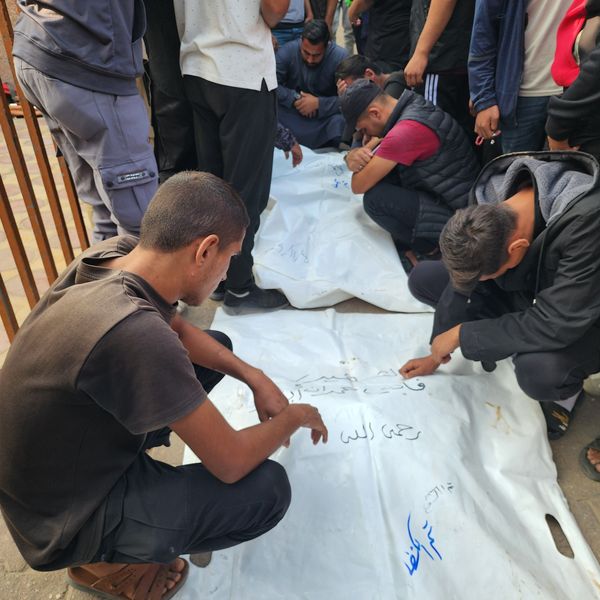Gaza: End of the Siege?
"This is the beginning of the total collapse of the
siege."
So said Hanin Zuabi, an Israeli Arab member of the parliament who was
aboard the flotilla that was attacked by Israel on May 31. That
judgment may be a bit premature, however, and both Hamas and the
Palestinian Authority are being far more cautious in their assessments
of the Israeli decision to weaken its blockade of Gaza.
Skepticism abounds, and with good reason. But yesterday's decision by
Israel is an important step that could unlock the frozen Middle East
peace process. Israel deserves no applause for its action, since the
blockade was wrong in the first place and since it remains unclear how
far the Israelis will go in implementing the new rules. Simultaneously
with the announcement by the Israeli cabinet, President Obama and Prime
Minister Netanyahu set a meeting in Washington on July 6, at which the
president will have to read the prime minister the riot act if there is
to be any forward movement in talks.
Aluf Benn, writing
in the liberal daily Haaretz, gives credit where credit is
due: to Turkey and its prime minister, for their support of the
flotilla:
"Turkish Prime Minister Recep Tayyip Erdogan can claim a big check
mark for himself, despite the Turkish flotilla not having reached Gaza
and nine activists aboard the Mavi Marmara ship having been killed
during the raid in May. Erdogan achieved his goal: He collapsed the
Israeli siege on 'Hamastan.' The cabinet announcement on Sunday put an
end to the three-year-old civilian blockade on Gaza, initiated when
Hamas took power."
Benn goes a little too far, of course. The siege hasn't ended yet,
and it's unclear precisely what commodities will be allowed to flow in
and out of Gaza. The naval blockade remains, but land crossings are to
be reopened, while being carefully controlled by the Israeli armed
forces. But Netanyahu himself said that while Israel will prevent
"weapons and war-supporting material" from entering Gaza, "All other
goods will be allowed into Gaza."
We'll see. There are major questions about how it will work out.
Construction materials and equipment, for instance, will be allowed only
when tied to projects approved by the Palestinian Authority and carried
out under international supervision, i.e., not by Hamas.
A White House statement, issued Sunday, stressed the importance of
the implementation of the new arrangements, saying:
"We will work with Israel, the Palestinian Authority, the Quartet,
and other international partners to ensure these arrangements are
implemented as quickly and effectively as possible and to explore
additional ways to improve the situation in Gaza, including greater
freedom of movement and commerce between Gaza and the West Bank. There
is more to be done, and the President looks forward to discussing this
new policy, and additional steps, with Prime Minister Netanyahu during
his visit to Washington on July 6."
Spokesmen for IHH, the Turkish organization that helped to assemble
the flotilla, are
taking credit, cautiously. Said Hossein Orush, an IHH board member:
"We will continue to struggle until the blockade is completely
removed and Palestine achieves independence. Israel must pay the price
for its illegal actions in the international court and be subjected to
an international committee that will probe the outcome of the flotilla."
And the IHH spokesman Omar Faruk said:
"This is a victory for the people of Gaza and their joint struggle
with the humanitarian organizations. ... We are still not entirely pleased
and will continue to act toward the complete removal of the blockade on
Gaza."
An Urgent Message From Our Co-Founder
Dear Common Dreams reader, The U.S. is on a fast track to authoritarianism like nothing I've ever seen. Meanwhile, corporate news outlets are utterly capitulating to Trump, twisting their coverage to avoid drawing his ire while lining up to stuff cash in his pockets. That's why I believe that Common Dreams is doing the best and most consequential reporting that we've ever done. Our small but mighty team is a progressive reporting powerhouse, covering the news every day that the corporate media never will. Our mission has always been simple: To inform. To inspire. And to ignite change for the common good. Now here's the key piece that I want all our readers to understand: None of this would be possible without your financial support. That's not just some fundraising cliche. It's the absolute and literal truth. We don't accept corporate advertising and never will. We don't have a paywall because we don't think people should be blocked from critical news based on their ability to pay. Everything we do is funded by the donations of readers like you. Will you donate now to help power the nonprofit, independent reporting of Common Dreams? Thank you for being a vital member of our community. Together, we can keep independent journalism alive when it’s needed most. - Craig Brown, Co-founder |
"This is the beginning of the total collapse of the
siege."
So said Hanin Zuabi, an Israeli Arab member of the parliament who was
aboard the flotilla that was attacked by Israel on May 31. That
judgment may be a bit premature, however, and both Hamas and the
Palestinian Authority are being far more cautious in their assessments
of the Israeli decision to weaken its blockade of Gaza.
Skepticism abounds, and with good reason. But yesterday's decision by
Israel is an important step that could unlock the frozen Middle East
peace process. Israel deserves no applause for its action, since the
blockade was wrong in the first place and since it remains unclear how
far the Israelis will go in implementing the new rules. Simultaneously
with the announcement by the Israeli cabinet, President Obama and Prime
Minister Netanyahu set a meeting in Washington on July 6, at which the
president will have to read the prime minister the riot act if there is
to be any forward movement in talks.
Aluf Benn, writing
in the liberal daily Haaretz, gives credit where credit is
due: to Turkey and its prime minister, for their support of the
flotilla:
"Turkish Prime Minister Recep Tayyip Erdogan can claim a big check
mark for himself, despite the Turkish flotilla not having reached Gaza
and nine activists aboard the Mavi Marmara ship having been killed
during the raid in May. Erdogan achieved his goal: He collapsed the
Israeli siege on 'Hamastan.' The cabinet announcement on Sunday put an
end to the three-year-old civilian blockade on Gaza, initiated when
Hamas took power."
Benn goes a little too far, of course. The siege hasn't ended yet,
and it's unclear precisely what commodities will be allowed to flow in
and out of Gaza. The naval blockade remains, but land crossings are to
be reopened, while being carefully controlled by the Israeli armed
forces. But Netanyahu himself said that while Israel will prevent
"weapons and war-supporting material" from entering Gaza, "All other
goods will be allowed into Gaza."
We'll see. There are major questions about how it will work out.
Construction materials and equipment, for instance, will be allowed only
when tied to projects approved by the Palestinian Authority and carried
out under international supervision, i.e., not by Hamas.
A White House statement, issued Sunday, stressed the importance of
the implementation of the new arrangements, saying:
"We will work with Israel, the Palestinian Authority, the Quartet,
and other international partners to ensure these arrangements are
implemented as quickly and effectively as possible and to explore
additional ways to improve the situation in Gaza, including greater
freedom of movement and commerce between Gaza and the West Bank. There
is more to be done, and the President looks forward to discussing this
new policy, and additional steps, with Prime Minister Netanyahu during
his visit to Washington on July 6."
Spokesmen for IHH, the Turkish organization that helped to assemble
the flotilla, are
taking credit, cautiously. Said Hossein Orush, an IHH board member:
"We will continue to struggle until the blockade is completely
removed and Palestine achieves independence. Israel must pay the price
for its illegal actions in the international court and be subjected to
an international committee that will probe the outcome of the flotilla."
And the IHH spokesman Omar Faruk said:
"This is a victory for the people of Gaza and their joint struggle
with the humanitarian organizations. ... We are still not entirely pleased
and will continue to act toward the complete removal of the blockade on
Gaza."
"This is the beginning of the total collapse of the
siege."
So said Hanin Zuabi, an Israeli Arab member of the parliament who was
aboard the flotilla that was attacked by Israel on May 31. That
judgment may be a bit premature, however, and both Hamas and the
Palestinian Authority are being far more cautious in their assessments
of the Israeli decision to weaken its blockade of Gaza.
Skepticism abounds, and with good reason. But yesterday's decision by
Israel is an important step that could unlock the frozen Middle East
peace process. Israel deserves no applause for its action, since the
blockade was wrong in the first place and since it remains unclear how
far the Israelis will go in implementing the new rules. Simultaneously
with the announcement by the Israeli cabinet, President Obama and Prime
Minister Netanyahu set a meeting in Washington on July 6, at which the
president will have to read the prime minister the riot act if there is
to be any forward movement in talks.
Aluf Benn, writing
in the liberal daily Haaretz, gives credit where credit is
due: to Turkey and its prime minister, for their support of the
flotilla:
"Turkish Prime Minister Recep Tayyip Erdogan can claim a big check
mark for himself, despite the Turkish flotilla not having reached Gaza
and nine activists aboard the Mavi Marmara ship having been killed
during the raid in May. Erdogan achieved his goal: He collapsed the
Israeli siege on 'Hamastan.' The cabinet announcement on Sunday put an
end to the three-year-old civilian blockade on Gaza, initiated when
Hamas took power."
Benn goes a little too far, of course. The siege hasn't ended yet,
and it's unclear precisely what commodities will be allowed to flow in
and out of Gaza. The naval blockade remains, but land crossings are to
be reopened, while being carefully controlled by the Israeli armed
forces. But Netanyahu himself said that while Israel will prevent
"weapons and war-supporting material" from entering Gaza, "All other
goods will be allowed into Gaza."
We'll see. There are major questions about how it will work out.
Construction materials and equipment, for instance, will be allowed only
when tied to projects approved by the Palestinian Authority and carried
out under international supervision, i.e., not by Hamas.
A White House statement, issued Sunday, stressed the importance of
the implementation of the new arrangements, saying:
"We will work with Israel, the Palestinian Authority, the Quartet,
and other international partners to ensure these arrangements are
implemented as quickly and effectively as possible and to explore
additional ways to improve the situation in Gaza, including greater
freedom of movement and commerce between Gaza and the West Bank. There
is more to be done, and the President looks forward to discussing this
new policy, and additional steps, with Prime Minister Netanyahu during
his visit to Washington on July 6."
Spokesmen for IHH, the Turkish organization that helped to assemble
the flotilla, are
taking credit, cautiously. Said Hossein Orush, an IHH board member:
"We will continue to struggle until the blockade is completely
removed and Palestine achieves independence. Israel must pay the price
for its illegal actions in the international court and be subjected to
an international committee that will probe the outcome of the flotilla."
And the IHH spokesman Omar Faruk said:
"This is a victory for the people of Gaza and their joint struggle
with the humanitarian organizations. ... We are still not entirely pleased
and will continue to act toward the complete removal of the blockade on
Gaza."

